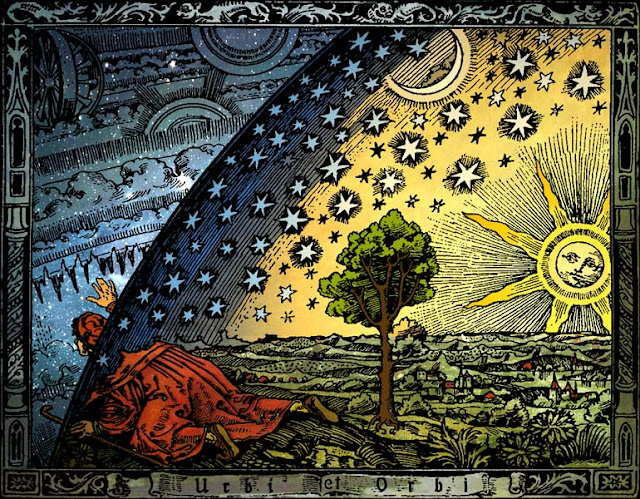The Flammarion woodcut (*!engraving!*) depicts a man looking outside of space and time. For Kant, what is external to us is external to space and time also, and can never be known as a thing-in-itself. (page 170)
DK THE PHILOSOPHY BOOKImmanuel Kant (1724-1804):
Saying that I exist,requires a determinate point in time. This requires an actually existing outside world in which time takes place. We can only experience time through things in the world that move or change,such as the hands of a clock. Time is experienced by us indirectly.
Immanuel Kant (1724-1804):
My personal Note:
The Flammarion woodcut (*!engraving!*) is ME itself;
The wood engraving has often, but erroneously, been referred to as a woodcut. Wikipedia
Kant says that anything outside from us, what is not observed - does not exist in the same space and time as we do. So any person that observe is, by act of observing, creating its reality and universe. This may entail changes of things that are not observed - but once we observe them, they are incorporated into reality and they are not changes any more - especially for people near that change, it will be their reality all along. This is how reality, universe works and it is proven by quantum physics - double slit experiment and Schrödinger's cat. Since the universe is all the same for everyone, this counts out parallel universes per se and/or hologram reality per se, since observable universe is the same for all inhabitants of this planet - once it is observed. ME is Schrödinger's cat box opened, we are aware of both possible states, one by observing (once you open the box), the other in our memory.
This means in everyday life, what you observe is prone to change once you don't observe it anymore. Thus we can't be certain about anything if not double checked. It may "magically" change, down to earth explanation will be false memory - but it may as well be something "supernatural" behind the scenes, as well.
This means in everyday life, what you observe is prone to change once you don't observe it anymore. Thus we can't be certain about anything if not double checked. It may "magically" change, down to earth explanation will be false memory - but it may as well be something "supernatural" behind the scenes, as well.
Nietzsche took Kant's wisdom, and he explained his words as if this is proof that God is dead. I don't think Kant wanted to say this. The external world constantly changing, ie "the real world is absolutely unattainable" means actually that we are in interaction with God. This is not to punish us, but to help us along the way. For example, we may get hurt in the past, but after many years looking back, we may find out that probably 1) we were too sensitive at the time 2) if we have witnesses (diaries, people) it may actually turn out that our hurtful past, unbearable incident from the past - is actually now, under new retrospection, new perspective - somewhat different than as we remember it.
More Philosophy:
I also take it as granted that every created thing, and consequently the created monad also, is subject to change, and indeed that this change is continual in each one.
GOTTFRIED LEIBNIZ
;
Leibniz claims that every human mind is a monad, and so contains a complete representation of the universe. It is therefore possible in principle for us to learn everything that there is to know about our world and beyond simply by exploring our own minds.
GOTTFRIED LEIBNIZ


Nema komentara:
Objavi komentar